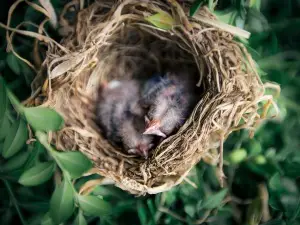
Birds raise their babies in curious ways, bird parents will make crop milk for their babies, kick them out of the nest if they have a defect, and sit on their eggs to help them hatch.
But what about after the babies hatch? Do mother birds sit on their babies after they hatch? This article looks into it
Mother birds do sit on their babies after they hatch, this helps the mothers share body heat with the baby chicks early on in the babies’ life.
Table of Contents
Do mother birds sit on their babies after they hatch?
Mother birds do sit on their babies after they hatch, mother birds initially sit on eggs and then sit on baby birds after they hatch.
Mother birds sit on their eggs to incubate them. Incubating eggs keeps them warm and, it creates an environment with the right level of humidity for the baby birds in the eggs to grow and eventually hatch.
Once the eggs hatch, the mother will sit on the baby birds
Baby birds usually come out of the eggs with no feathers. A newly hatched baby bird is called a hatchling. Because these birds don’t have feathers, the baby birds aren’t able to maintain their body heat.
Hatchlings can chill very quickly and easily, this chilling can easily lead to death.
To avoid chilling and eventually death, the mother bird will sit on her babies and share her body heat. This is called brooding baby birds
She will sit on her babies until the bird grows enough feathers to keep itself warm. Baby birds with feathers are called fledglings, the muscle mass that they develop also helps to keep them warm.
Some mother birds will naturally have a bare patch of skin on their bodies which they press against baby birds to keep them warm. This patch of skin is called a brood patch.
Other types of birds will rip feathers off of their bellies in order to create a brood patch.
The brood patch is covered by long contour feathers. When mother birds brood their babies, the long contour feathers keep the babies covered up. These contour feathers also work to prevent heat from escaping as the baby birds are warmed up.
The brood patch is able to transfer heat very well because the blood vessels in the area become filled with blood prior to incubation and stay this way during incubation and during brooding.
Large amounts of blood will move through the blood vessels at the brood patch and this is how heat is transferred, this keeps baby birds warm.
The mother bird will sit on her babies, moving only when she needs to, until the babies become fledglings, this time can differ from bird to bird.
FAQ:
Do mama birds sleep with their babies at night?
In addition to mother birds sitting on their babies during the day, the mother birds will also sit on the babies at night too. This will not only keep them warm but guard against predators as well.
A variety of baby bird predators come out at night, predators like snakes, owls, and raccoons. Having the mother around keeps the vulnerable baby birds safe.
How do mother birds not suffocate their babies?
Mother birds don’t crack their eggs when incubating and they don’t suffocate their babies when keeping them warm either. She instinctively knows how to keep them warm without crushing them.
She will not jump on her babies with all her body weight, the mother will gently put her body on them after rearranging them and walking around the baby birds to figure out how best to sit on them.
Once she has figured out how to sit, she will place her feet on the sides of the baby birds and then carefully lower herself.
She doesn’t exactly sit on the birds, it’s more of a relaxed crouching position that doesn’t damage her babies. The mother bird’s flexible breast bone wraps itself around the chicks without injuring them
Conclusion
In conclusion, mother birds will sit on their babies after they hatch because they have to. Baby birds are not very good at regulating their own body temperature because they have no feathers, thus, the mother bird has to sit on them and create a closed environment that keeps them warm.
She will not crush or suffocate the baby birds as she sits on them, she is not sitting directly on them, she is rather crouching over them.
If you enjoyed this article then you may also be interested in other baby bird related articles. Here are some articles that you may be interested in: Why Is My Baby Bird Shaking?, How To Protect Baby Birds From Crows, Do Birds Mourn The Loss Of Their Nest?, Do Bird Beaks Grow?, Do Mother Birds Leave Their Babies At Night?,

